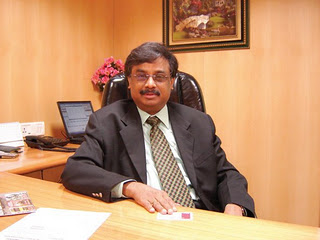 “Arul Ratnam worked in a small garment factory in Tirupur and had to toil for his living. He did just about anything like packing and loading and even delivered goods as a truck assistant. Today he owns a fleet of trucks that meets the transport needs of not only the garment unit where he worked but many other companies. He is now thinking of setting up his own garment business. All through this journey, there is one company that has stood by him and financed all his needs right from the very first truck, and that is Shriram Transport Finance Company (STFC). Arul Ratnam is one among the thousands of customers to whom Shriram has made a world of difference. The company’s marketing and sales efforts have penetrated the grassroot level in many regional markets, including solid customer alliances.”
“Arul Ratnam worked in a small garment factory in Tirupur and had to toil for his living. He did just about anything like packing and loading and even delivered goods as a truck assistant. Today he owns a fleet of trucks that meets the transport needs of not only the garment unit where he worked but many other companies. He is now thinking of setting up his own garment business. All through this journey, there is one company that has stood by him and financed all his needs right from the very first truck, and that is Shriram Transport Finance Company (STFC). Arul Ratnam is one among the thousands of customers to whom Shriram has made a world of difference. The company’s marketing and sales efforts have penetrated the grassroot level in many regional markets, including solid customer alliances.”
Shriram has managed to build a workforce of over 10,000 people who are virtually the face and the backbone of the organisation. What it has managed to achieve has huge social impact and has helped in raising the living standards of its customers. The company has proved that a corporate can achieve excellent returns for investors from a business that is all about transforming lives and social uplifting.

Mr. Sridhar, Managing Director, Shriram Transport, says that initially his company entered this unique business segment which was perceived to be risky with a limited flow of resources from banks and institutions. “We were aggressive in raising retail resources during this period for carrying on our activities. We have proved to the finance industry that this business is a high growth and profitable one. Today with increased confidence in our unique business model, banks and financial institutions are willing to channel their funds to small truck owners and pre-owned trucks by routing it through us”.
Shriram is the market leader in financing used commercial vehicles with a market share of over 20 per cent, which it aims to double in the next few years. The main objective is to make cheaper credit available to the credit-starved segment of small truck owners.
Tracing the history, Mr. Sridhar said: “When we started lending to small truck owners to buy new vehicles, we found a mismatch between their aspirations and ability. The truck operator was not capable enough to support the credit levels required to buy a new truck. Hence we decided to think out of the box and fund pre-owned trucks. This was the biggest decision we took, and the results followed. From driver to owner, even if only of a pre-owned truck, and from pre-owned truck to a new truck, we have been with him in his journey of prosperity. What we have done is nothing but backing a small trucker whom we call the unsung hero of the Indian economy”.
STFC was established in 1979 with the objective of offering funds for small operators to buy trucks. As distribution of truck ownership was scattered among a large number of individuals, this very important group was missed by the institutional radar. It is estimated that 80 per cent of trucks in the country are in the hands of individuals.
Mr. Sridhar says: “We are financing unbankable people, namely, those who don’t have any banking habit and are in the grip of the unorganised sector. We are the only organised credit provider to these unbankable customers. In a way we bring these customers out of the unorganised segment and provide them cheaper credit. For Shriram, the credit-worthiness of the small truck owner has always been an article of faith. This faith has guided our journey from our pioneering days in financing small truck owners to the present-day leadership. Today Shriram is the leader in truck finances. We are also India’s largest asset-based non-banking finance company”.
With a current network of 500 branches spread across the country, covering 91.3 per cent of truck owners, the company plans to extend operations to reach 100 per cent of truck owners. Shriram employs nearly 10,000 people and has assets under management (AUM) in excess of Rs. 18,000 crores ($4.2 billion), with live contracts of more than 6,00,000 customers. It is targeting expansion of its customer base to one million by 2010 and is now looking at developing an integrated business model by financing other segments like three-wheelers, tractors and passenger commercial vehicles such as buses and vans.
Mr. Sridhar observes: “We are not just financing the vehicle but we also understood the truck owner’s requirement for working capital and financed them by providing different loans like tyre loan and engine replacement loan. Another pioneering initiative is providing credit card. None of these small truckers have been provided credit card so far. We have tied up with Axis Bank and provided credit card for about 25,000 to 30,000 customers. We have also tied up with Ashok Leyland in the transport exchange initiative through which we will be able to offer bill discounting facility, which is otherwise done through money lenders in the unorganised segment”.
Today, small road transport operators own 70-75 per cent of the trucks on roads. Though they account for an indirect contribution to India’s economic growth, the credit support to them is expensive, inequitable and exploitative. Banks are unable to evaluate their credit-worthiness due mainly to lack of proper documentations. Consequently this business segment is flocked by private financiers catering to over 70 per cent of the used truck market. As a result, truck owners are subjected to exorbitantly high interest rates.
Moreover the market penetration of organised players is restricted due to the necessity of a strong local presence, efficacious customer evaluation tools and a well-established network.
In the emerging situation, the truck financing industry is left with huge untapped potential. With the modernisation of aging trucks on the anvil, the average age of the national fleet is expected to be reduced to seven years, in the next five years. This would speed up replacement of older trucks. As per McKinsey report, truck financing is emerging as a profitable business opportunity unveiling a potential of Rs. 45,000 crores. Demand for pre-owned truck financing alone is estimated at Rs. 22,500 crores.
Shriram prides itself on a perfect understanding of the customer and his needs. Each product or service is tailor-made to perfectly suit his needs. It is this guiding philosophy of putting people first that has made it the preferred choice for all truck financing requirements amongst customers. Most of the retail lending by banks/financial institutions is information-based. Credit evaluation, vehicle delivery and dues collection posed huge challenge in truck financing. Unlike others, Shriram does not believe in outsourcing these functions.
The truck financ
ing industry is of course a lucrative business. Shriram can take credit for having brought about a revolution in the institutional mindset. Today, Citigroup, UTI Bank, ICICI Bank and other leading banking institutions are proud associates of Shriram in financing pre-owned trucks.
Dealing with small customers has its share of risks. But Mr. Sridhar is always positive. “Historically credit losses for the company have been very low, at around two per cent. This particular industry is quite stable and reliable. We have a team of over 10,000 people, and we are the only organisation wherein there are no intermediaries between us and the truckers. We are in touch with our customers on a direct basis and finance them without the involvement of intermediaries. We interact with our customers on a day-to-day basis and we sanction nearly 1,000 to 1,500 loans every day. All these loans are sanctioned without taking any major security or post-dated cheques since most of these customers are not familiar with banking. The whole process is relationship based.”
According to him, the next few years will witness exponential growth in business. Shriram has covered only 20 per cent of the total business, and there is still a huge market which is left untapped. The challenge will be in preparing itself to manage this growth. Hence the company emphasis on building its HR capacity.
In order to widen its network, the company is developing partnerships with local private financiers, who manage around 75 per cent of the pre-owned truck financing market. By giving them access to competitive finance, Shriram plans to increase penetration into more widely dispersed regions of the country more effectively.
Mr. Sridhar was extremely confident that, “The initiatives we have taken today will be massive in size and volume in the next 10 years time and we look around and see not many companies who are interested in catering to this segment of customers. Its a nation building activity and fundamentally its a social service to a community which has been denied credit and in the process we also make profits”.
With the soaring interest rates, Shriram has deliberately moved away from the high-cost retail finance mobilisation to comparatively cheaper band and institutional finance. This has enabled it to absorb to some extent the effect of rising interest cost. The market opportunities for commercial vehicle finance business are tremendous, and even in the case of a slowdown in the vehicle industry, the company’s operations won’t be affected.